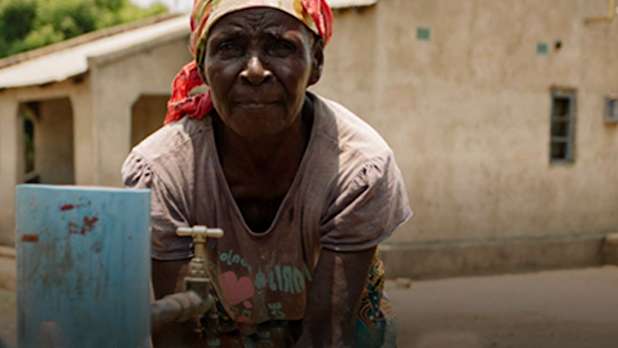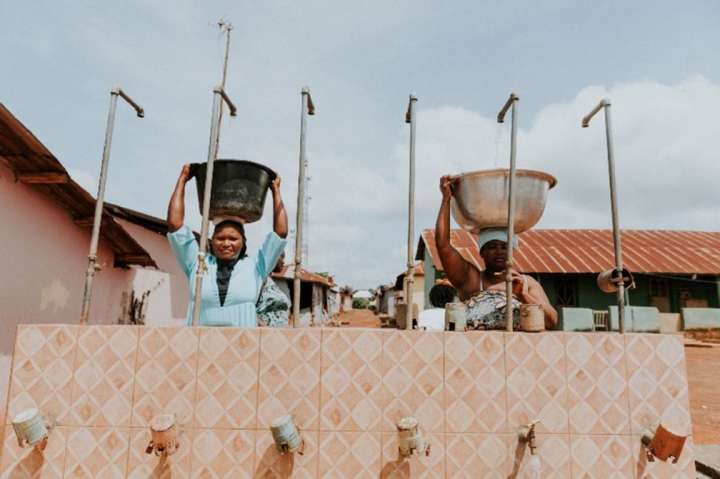
Our CEO Shirine Khoury-Haq launched our Water Security for People and Planet Report at COP-27 in 2022.
Read the full report here.
Water is essential for a secure future. We believe that investing in water security – sustainable, resilient water resources and services – is the best way to address climate vulnerability and inequalities and reduce the effects of climate change.
703 million people globally still lack access to basic drinking water services and only 54% of the world's population is using safely managed sanitation services. By 2050 it is estimated 52% of the world's population will live in water-stressed regions.
Co-op remains the only supermarket with an own brand charity water, which is available at almost 7,500 convenience stores (including independent Nisa retailers supplied by Co-op). We continue to invest above and beyond 0.7% of our pre-tax profit in international development projects, and we’re committed to upholding that promise for years to come. Our pioneering water security donations with our partners The One Foundation and Water Unite contribute to this commitment.
Without water, there is also no food. The impending shortfall in water availability, coupled with farming’s reliance on water (72% of all freshwater withdrawals are for agriculture*) means we’re all facing into increasingly serious risks linked to food and water security.
Dwindling water resources are also under pressure from pollution, often from agriculture. In England, Rivers Trust data shows none of our rivers are in good overall health with 62% of river pollution attributed to agriculture and rural land management.
As a food business, Co-op is committed to playing our part to improve this situation. Our work on water security aims to increase access to clean water; whilst also working with others in the supply chain to protect our farmers and food supply from growing risks, without compromising water resources for people and nature.
*UN Water
We are founding supporters of WRAP’s Roadmap towards Water Security for Food & Drink Supply, which gives us a way of working collaboratively with peers, suppliers and local delivery bodies to help achieve sustainable water management in some of the most water-stressed food sourcing areas in the UK and overseas. The overall aim of the Roadmap is to collectively source 50% of the UK’s fresh food from areas with sustainable water management.
As a food retailer, the Roadmap commits us to a set of actions to help play our part alongside others:
Working collectively with other food businesses, suppliers, growers, farmers and local stakeholders is critical to achieving water security, because together we can achieve much more impact and because water is a shared resource. No single user can achieve water security alone.
In 2023, Co-op working with WWF and WRAP, alongside signatories to WWF’s Retailers’ Commitment for Nature (WWF Basket), agreed to a series of Leadership Actions to strengthen and align agricultural standards, advocate for better water governance, and harmonise our mapping, measurement and reporting. We also provided associated funding contributions intended to drive progress towards the milestones set out in the Water Roadmap, and to catalyse other organisations across the food and drink sector to also act, fund and support delivery.
We’ve continued to provide core funding towards seven Water Roadmap collective action projects in key sourcing areas across the UK, Kenya, South Africa, Spain and Peru. These projects enable us to play our part in helping to achieve better water management on the ground, working with networks of farmers, local stakeholders, and technical experts to deliver action plans and secure additional funding for nature-based solutions. By having a stewardship focus in defined areas we believe we can make a meaningful difference, and this will form an important contribution towards UN Sustainable Development Goal 6 – to ensure availability and sustainable management of water and sanitation for all. For more information on how we're increasing access to water and sanitation, read about our pioneering partnerships with The One Foundation and Water Unite.
Alongside our work with WRAP’s Water Roadmap, we have a long-standing commitment to working with our suppliers on reducing pesticide use through our Crop Protection work. Co-op came 3rd in Pesticide Action Network’s Supermarket Ranking 2024, and was scored as “making good progress” or leading the way on all criteria.

Since 2007, we’ve raised over £25 million in partnership with The One Foundation and Water Unite.
This funding is thanks to Co-op member-owners and customers, who donate to water projects across the globe every time they purchase Co-op water and ice, as well as well as all other branded bottled water. We donate 3p per litre to The One Foundation for every Co-op branded still, sparkling and flavoured water sold, and Co-op branded ice. We donate 1p per litre to Water Unite for all other still and sparkling water bottles sold*.
*Flavoured water and mixers (including tonic and soda water) are excluded.
Co-op has worked with The One Foundation since 2007, investing in clean water, sanitation and hygiene (WASH) projects around the world. We raise donations through sales of Co-op own label bottled water to support WASH solutions in some of the world’s communities living in the most extreme poverty, donating over £22 million and changing the lives of more than 3.1 million since 2007.
Our Future of Food commitment to clean water for all remains at the heart of our fight against water poverty
Read more about The One Foundation and watch this video on how The One Foundation changes lives.
Over the last seven years, Co-op and The One Foundation have been working with Co-op’s Fairtrade banana producer communities in the Volta region of Ghana to develop locally owned and managed water stations. The six water stations that Co-op have funded within their Banana Producer communities are providing over 14,000 people with safe, clean water - piping out water over a combined distance of 35kms and directly into over 800 homes. These water stations are supporting people like Julius.
“Life was so difficult in terms of water. A lot of school children were going to school late, they can now go to school very early because of safe water.
Health is one of the issues that concerns us. So, when you get clean, safe water it will help you overcome ill health issues, like waterborne diseases. This water is good for us.
It was not a difficult process. You take your card to be identified with, you register your money for the connection and the rest was done. You have done well bringing safe water into our community”.
Julius, School Teacher, Volta Region (pictured).

Eveline operates a milk vending business in Githogoro, an informal settlement in Nairobi, Kenya. Until recently, Eveline depended on informal water vendors or unreliable water points for water. These would often be closed without warning, forcing her to fetch water from other sources which were very far from her shop.
Her business requires at least 10 jerry cans of water a day for the cleaning of the dispensing machine and containers. This was costing Eveline 100 Kenyan Shillings (Kes) per day, which for a small business was very expensive.
As one of the beneficiaries of the newly pre-paid water dispensers installed in Githogoro, Eveline now has access to a reliable, affordable clean water supply, which is crucial to the success of her business.
“Since I started using the pre-paid water dispensers, my business is able to save about Kes 1500 per month. This has helped me increase the stock for my shop and I am able to sell other things in addition to milk. The water is just across the street from my shop, it’s treated and I do not fear contaminating my milk equipment. With just Kes 20, I have a whole week’s supply of water and previously this was not even enough for one day”. Eveline - Nairobi, Kenya

We also are pioneering partners for Water Unite, and, together with our branded suppliers, our funding has helped support innovative local entrepreneurs working to tackle water, sanitation, and plastic waste issues in developing countries across Africa and Asia.
In April 2017, we signed up as pioneer partners to Water Unite (then the Global Investment Fund for Water), so now every branded bottled water that we sell contributes 1p per litre to the fund, which aims to end water poverty globally by 2030.
Water Unite uses an innovative funding model to leverage investment in the systems needed to keep clean water flowing, and to tackle plastic pollution. Together with our branded water suppliers over £4.3million has been raised since 2017.
Together with Co-op water, every bottle of water bought in a Co-op helps to support clean water, hygiene, sanitation and water pollution projects across the world. So, when you buy water from Co-op, feel proud.
Read more about Water Unite.
Significantly more Kenyans have access to safe drinking water (59%) than to basic sanitation (29%). Since 2000, access to safe drinking water has increased by 12%, while access to basic sanitation has fallen by 5%. An estimated five million people practice open defecation and only 25% have hand-washing facilities with soap and water at home.
To address this crisis, Sanivation partners with local utilities and governments to deploy sustainable sanitation solutions and solve complex societal sanitation challenges using a circular economy approach. Through developing treatment plants across East Africa, they are able to meet the increased demand for waste management which cannot be managed by existing urban infrastructure which is typically underfunded. By processing the waste into a solid fuel or briquette, they have provided a low carbon, affordable, bioenergy end product whilst simultaneously managing waste which may have otherwise resulted in the spread of diseases.
In 2022, Sanivation helped to serve 52,675 people by safely managing 995 tonnes of faecal sludge and selling 882.7 tonnes of briquettes. This has saved the equivalent of 1,645 tonnes of CO2 and 18,075 trees.
“Co-op and Water Unite have allowed us to partner with new local governments and take an innovation that allows cities to be clean, healthy and productive to new locations, and be able to ensure that waste is being treated properly.” - Andrew Foote, Co-founder of Sanivation
At the Co-op we are committed to being part of the solution to plastic pollution worldwide. With our partner Water Unite we have supported the Gjenge Makers project in Kenya, which converts plastic waste into an affording housing material. The project was awarded the Young Champions of the Earth Award by the UN Environment Programme.